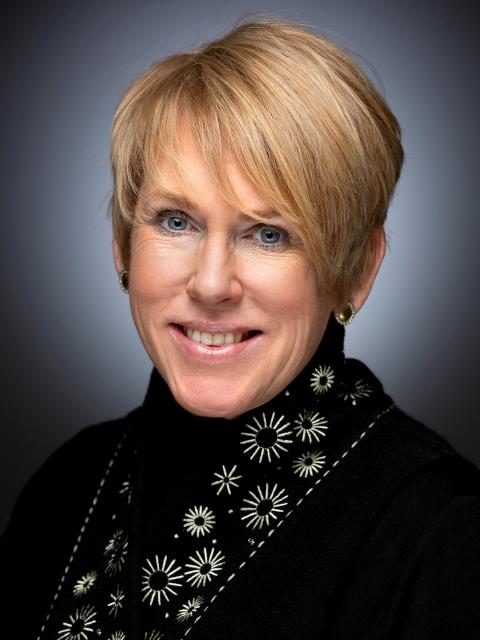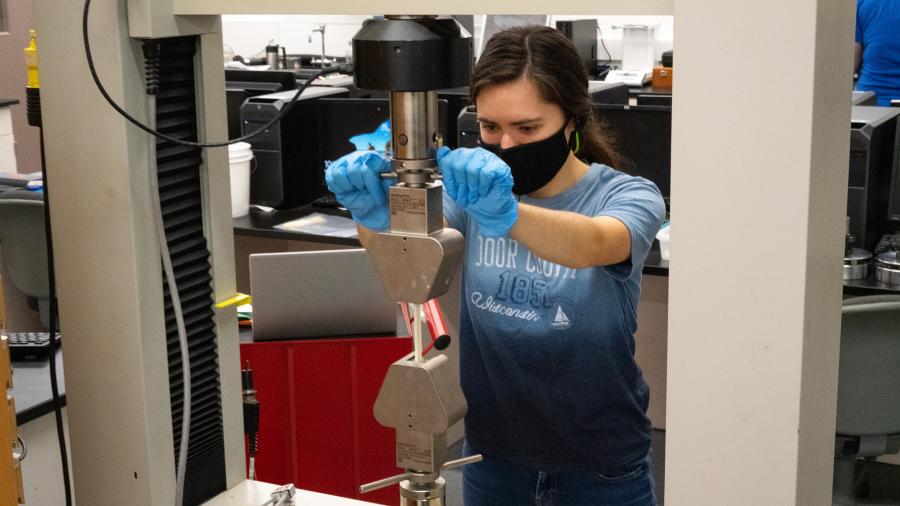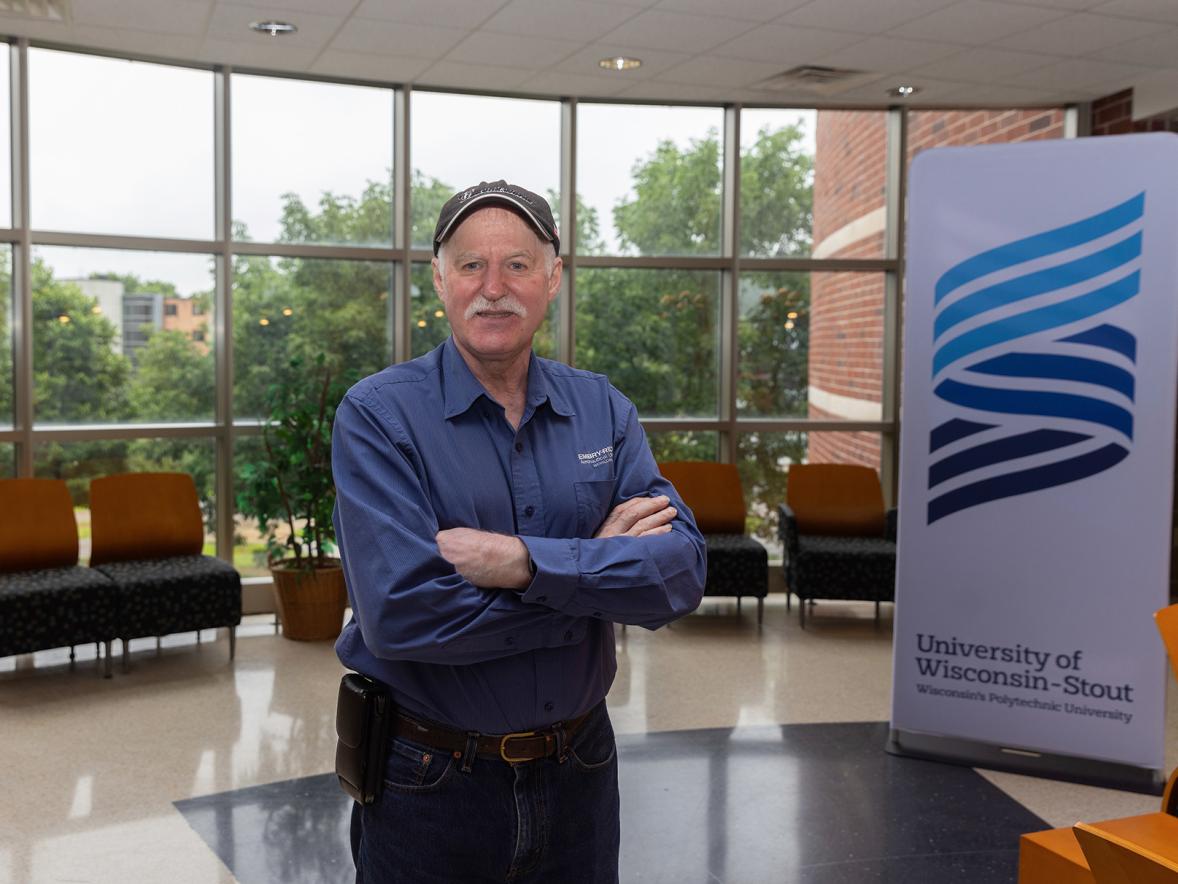Chancellor Katherine Frank acknowledged it was an understatement when she said her first year at University of Wisconsin-Stout was “suffice it to say, unusual.”
One week after beginning the job in March 2020, the pandemic hit, forcing the university to quickly transition to alternative teaching methods. The challenge at a polytechnic like UW-Stout, where labs and experiential learning are part of the school’s mission, was especially daunting.
Frank, the eighth leader in the school’s 130-year history and first female leader, told the UW System Board of Regents on Thursday, April 8, in a featured presentation that she is proud of how the university and its students responded — taking the challenge head-on but also learning from it and using it as an opportunity to set long-term strategic goals.
UW-Stout was scheduled to host the Regents meeting in Menomonie, but it was held virtually, except for board members and UW System President Tommy Thompson in Madison. Frank spoke from her office at UW-Stout.

“Our success navigating this challenging period, with the additional complexities of doing so as a polytechnic, is due to the dedication, hard work, and innovation of our university community — the faculty, staff, and students as well as our many friends, partners, and supporters in the immediate community and of course well-beyond,” Frank said.
“While the COVID pandemic has been challenging from both an operational and financial perspective, Stout was well-positioned to transition to virtual and hybrid models due to the fact that we are the only laptop campus in the UW System and have more than 20 years of experience as leaders in online education,” Frank said.
A video played during an Education Committee presentation, “Teaching During the Pandemic,” highlighted efforts by faculty members Wei Zheng in plastics engineering and Tamara Brantmeier in the School of Art and Design to provide hands-on learning when in-person labs weren’t available because of social distancing.
Another example of the school’s ability to shift during the pandemic was changing its well-attended biannual Career Conferences to virtual while maintaining and even improving some aspects of the experience for employers and students, Frank said.
UW-Stout also maintained a 97%-plus employment rate for recent graduates during the pandemic.
FOCUS 2030 plan
Frank cited a favorite comment from a student about how UW-Stout’s approach to education is to take a problem and turn it sideways. The school is doing that as well with the pandemic.
“True to our commitment to continuous improvement as a 2001 Malcolm Baldrige Quality Award winner and the only four-year university to have received this honor, we have challenged ourselves throughout the pandemic to do even better,” she said.
Her presentation, titled UW-Stout: Planning through the Lens of COVID, highlighted various areas in which the university is moving forward because of the pandemic with its FOCUS 2030 strategic plan.
One of them is the new esports program, featured in the video “From Game Design and Development to Esports” that was played during the Education Committee presentation. The Blue Devil esports competitive team, which helps build enrollment and retention through student engagement, began in fall 2020.
“It’s our obligation to apply the lessons learned through this period to position us for success as Wisconsin’s ‘new’ polytechnic within a post-pandemic
landscape,” Frank said. “There will be a lot we can take from the pandemic and apply to the future. We must take these lessons and apply the good and bad. A lot will be different at Stout going forward.”
The FOCUS 2030 target areas include university identity; student success; employee success; institutional sustainability; and equity, diversity and inclusivity.
UW-Stout’s equity, diversity and inclusivity goal is embedded in each of the FOCUS 2030 goals, Frank said. “We are committed to eradicating barriers to student success,” she said.
One 2030 initiative is to produce “triple-threat” graduates, students who possess a university degree, have an academically-linked experiential learning opportunity and carry an industry-recognized professional credential, she said.

Half of current students already meet this goal. The strategic plan calls for 100% “triple-threat” graduates by 2030. UW-Stout ensures that 100% of students graduate with at least one experiential learning opportunity.
Frank cited a Thomson Reuters partnership as a case in point of how UW-Stout plans to remain sustainable as an institution with industry-supported academic programs. A digital marketing undergraduate program, driven by a need for skilled workers, was created in 2015 with Thomson Reuters.
Pat Meuers and Abby Fawcett, UW-Stout graduates, discussed the program’s positive impact at FindLaw Digital Solutions, a Thomson Reuters division that supports law firms. Meuers, 1992 graduate, is vice president of FindLaw and Fawcett, 2019 graduate in digital marketing technology, is a digital marketer.
Student success is the focus of everything UW-Stout does and is targeting with its FOCUS 2030 goals, Frank said. She highlighted comments from Professor Urs Haltinner, who teaches career and technical education and training.
“As an educator, I push myself to prepare professionals with the capability to thrive in emergent teaching, leading and learning paradigms," he said.
Three Board of Regents committee presentations
Frank’s presentation was one of four highlighting UW-Stout on April 8. The others were:
Education Committee: Interim provost Glendali Rodriguez and Dean of Students Sandi Scott presented Polytechnic FOCUS 2030, about how UW-Stout has remained committed to its polytechnic mission during the pandemic by adapting instruction methods to engage students virtually, without additional funding.
About 50% of UW-Stout classes have been in person this semester.
“We have not wavered in our commitment to our educational tenets of career focus, applied learning, and collaboration,” Rodriguez said.
The presentation cited examples of creative teaching efforts and the new esports program featured in the videos.
The esports program, a collaboration of Academic Affairs, Student Affairs and Blue Devil Athletics, has boosted student recruitment and retention efforts during the pandemic. The 33 esports team members represent 13 academic programs.
After Thursday approval by the Education Committee, on Friday the Regents approved a new undergraduate program at UW-Stout, a Bachelor of Science in arts administration and entrepreneurship.
Capital Budget and Planning Committee: UW-Stout’s physical campus was the focus of the presentation Planning and Building for the Future (COVID-19 and Beyond).
Presenting were Gindy Neidermyer, interim dean of the College of Science, Technology, Engineering, Mathematics and Management; and Justin Utpadel, director of Facilities Management.
They explained the need for the planned renovation of Heritage Hall, which opened in 1973. UW-Stout is seeking planning and design funding in the 2021-23 state budget and project funding in the 2023-25 budget.
Neidermyer and Utpadel used other projects as examples of how UW-Stout capitalizes on renovation opportunities to promote collaboration across campus: combining two classrooms into one interactive classroom n Jarvis Hall Tech Wing; and reconfiguring 11,000 square feet on third floor Fryklund Hall into a multiprogram lab space.
Research, Economic Development and Innovation Committee: A group of UW-Stout faculty, staff and students explained a new campus project, Buzz Digital, that melds game design with manufacturing to support the state workforce and economic growth.
Game design and development students are creating an interactive training simulation to teach Lean/Toyota Production Systems manufacturing concepts virtually, an option during the pandemic and beyond to replace in-person workshops.
The project, through UW-Stout’s regional Manufacturing Outreach Center, is providing students with industry experience and strengthening external partnerships with business and industry.
Speaking for UW-Stout about the project were:
- Randy Hulke, executive director, Discovery Center
- Ted Theyerl, senior management engineer, Discovery Center
- Andrew Williams, associate professor, game design and development
- Steve Datz, of Grafton, senior, game design and development-computer science
- Simon Meyer, of Mound, Minn., senior, game design and development
- Aram Wahler, of Chippewa Falls, graduate student, Master of Fine Arts in design
###






